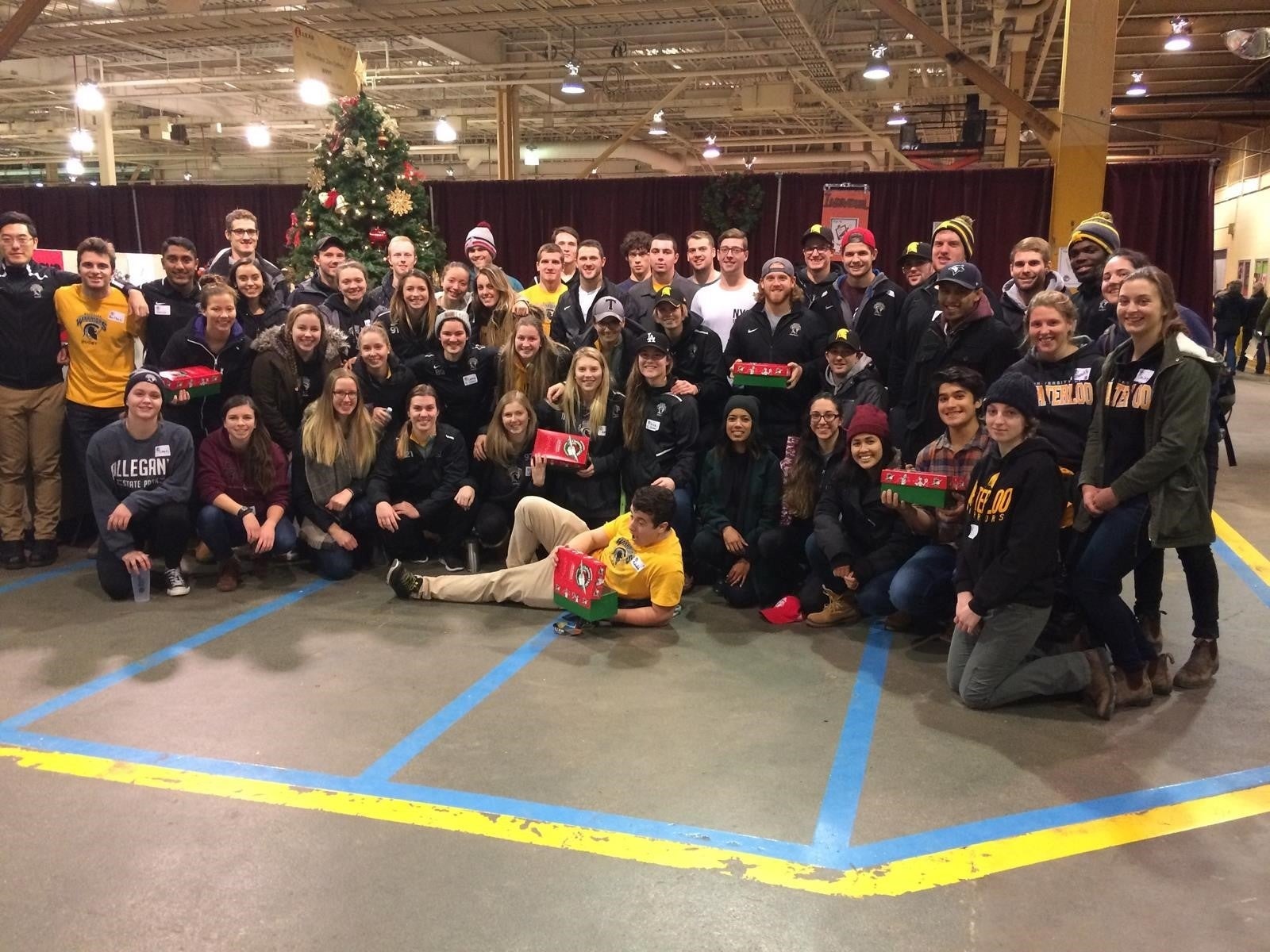Editor:
Brandon Sweet
University Communications
bulletin@uwaterloo.ca
New detection method shows a universe full of holes

Researchers from the University of Waterloo have developed a method that will detect roughly 10 black holes per year, doubling the number currently known within two years, and it will likely unlock the history of black holes in a little more than a decade.
Avery Broderick, a professor in the Department of Physics and Astronomy, and Mansour Karami, a PhD student also from the Faculty of Science, worked with colleagues in the United States and Iran to come up with the method that has implications for the emerging field of gravitational wave astronomy and the way in which we search for black holes and other dark objects in space. It was published recently in The Astrophysical Journal.
“Within the next 10 years, there will be sufficient accumulated data on enough black holes that researchers can statistically analyze their properties as a population,” said Broderick, also an associate faculty member at the Perimeter Institute for Theoretical Physics. “This information will allow us to study stellar mass black holes at various stages that often extend billions of years.”
Black holes absorb all light and matter and emit zero radiation, making them impossible to image, let alone detect against the black background of space. Although very little is known about the inner workings of black holes, we do know they play an integral part in the lifecycle of stars and regulate the growth of galaxies. The first direct proof of their existence was announced earlier this year by the Laser Interferometer Gravitational-Wave Observatory (LIGO) when it detected gravitational waves from the collision of two black holes merging into one.
“We don’t yet know how rare these events are and how many black holes are generally distributed across the galaxy,” said Broderick. “For the first time we’ll be placing all the amazing dynamical physics that LIGO sees into a larger astronomical context.”
Broderick and his colleagues propose a bolder approach to detecting and studying black holes, not as single entities, but in large numbers as a system by combining two standard astrophysical tools in use today: microlensing and radio wave interferometry.
Gravitational microlensing occurs when a dark object such as a black hole passes between us and another light source, such as a star. The star’s light bends around the object’s gravitational field to reach Earth, making the background star appear much brighter, not darker as in an eclipse. Even the largest telescopes that observe microlensing events in visible light have a limited resolution, telling astronomers very little about the object that passed by. Instead of using visible light, Broderick and his team propose using radio waves to take multiple snapshots of the microlensing event in real time.
“When you look at the same event using a radio telescope – interferometry – you can actually resolve more than one image. That’s what gives us the power to extract all kinds of parameters, like the object’s mass, distance and velocity,” said Karami, a doctoral student in astrophysics at Waterloo.
Taking a series of radio images over time and turning them into a movie of the event will allow them to extract another level of information about the black hole itself.
A Natural Sciences and Engineering Research Council Discovery Grant partially funded the project. Co-authors on the paper include Sohrab Rahvar of the Perimeter Institute for Theoretical Physics and the Sharif University of Technology in Iran and Mark Reid of the Harvard-Smithsonian Center for Astrophysics.
Beyond Experienced: award winner talks the power of co-op
Rachel McDonald exemplifies the combined power of education, research and experience. In just under five years, this Health Studies student did five co-op work terms with Sunnybrook Health Sciences Centre, authored or co-authored 25 published research articles and was flown twice internationally to present her research. Maybe that’s why she won the coveted “triple crown” Co-op Student of the Year award in 2015, recognized nationally, provincially and in her faculty. Hear about the power of co-op in Rachel’s own words:
Warriors get into the giving spirit

This is an excerpt of an article originally posted on the Department of Athletics and Recreation's website.
It's hard to imagine the life a student-athlete getting much busier with the balance of academics and athletics but giving back to the KW community is an important aspect of wearing the black and gold with pride. The dedicated Warriors student-athletes have been in the giving spirit this holiday season and have graciously given up their time to make a difference through community outreach initiatives.
Close to 100 student-athletes attended Operation Christmas Child (OCC) in late November, where shoeboxes were filled with hygiene items, school supplies, and toys, and are given to underprivileged children in Canada. To nobody's surprise, the on-staff managers at OCC mentioned that 8,102 boxes were packed in a single session, the most they have ever seen compiled in one session.
Mady Palmer, member of the swim team and one of the lead organizers was amazed by response of the student-athletes.
"For so many student-athletes to show up during such a busy time, shows the commitment to being leaders in our community," said Mady. "Students are juggling a lot this time of year, whether it be exams, final papers, and staying in game shape, so for that many student-athletes to take time to give back speaks volumes."
The Department of Athletics was also proud to host its ninth annual Think Pink Campaign throughout the month of November. Six different varsity games, a variety of recreational initiatives and other fundraising efforts targeted at students, faculty, staff, alumni, and community members combined to help raise over $16,000 for the Canadian Breast Cancer Foundation – Ontario Chapter, making it a nine year total of $193,600.
The highlight of the campaign came at intermission of a men's hockey game and halftime of a men's basketball game as 19 students combined to shave/cut their hair for the cause. The hair was donated to various charities (Pantene Beautiful Lengths, Locks of Love) while each individual used the hair cutting as a key motivator to raise money for Think Pink.
"I am so proud by everyone's efforts to help raise money and awareness for such an important cause," said marketing, events and outreach manager Jenny Mackay. "It's a real sense of community here at the University of Waterloo, and when our students get together to reach fundraising goals, it's amazing to see the collaborative effort shine through."
Holiday Office Closures
The Graduate Studies Office will be closed today from 12:30 p.m. to 4:30 p.m.
The Arts Undergraduate Office will be closed from 8:30 a.m. to 9:30 a.m. and 11:30 a.m. to 1:00 p.m. on Wednesday, December 21.
Institutional Analysis & Planning will be closed on Thursday, December 22 from 11:30 a.m. to 1:30 p.m. for its annual holiday lunch.
Link of the day
Walter Hachborn, founder of Home Hardware, dies at 95
When and where
University Club Christmas Lunch Buffet, Monday, November 28 to Friday, December 23, 11:30 a.m. to 2:00 p.m., University Club.
Examination period, Thursday, December 8 to Thursday, December 22.
The Writing Centre presents Dissertation Boot Camp, Monday, December 19 to Thursday, December 22.
Master of Business, Entrepreneurship and Technology (MBET) Program Webinar, Tuesday, December 20, 10:30 a.m.
Waterloo Women's Wednesdays: Holiday Luncheon, Tuesday, December 20, 12:00 p.m., University Club.
Advent Jazz Vespers, Tuesday, December 20, 7:00 p.m., Conrad Grebel Chapel.
Final Grad Write-In event of the term, Friday, December 23, 9:00 a.m., SCH 228F.
Holiday season closure, Saturday, December 24 to Monday, January 2. Most university buildings and services closed.
Co-operative work term begins, Monday, January 2, 2017.
Lectures begin, Tuesday, January 3, 2017.
Beyond 60 anniversary kick-off lecture, Monday, January 9, 2017, 7:00 p.m., Humanities Theatre.
The Writing Centre presents "Professionalism in your communication: How to talk to your professors", Tuesday, January 10, 2017, 10:30 a.m.
The Writing Centre presents "Say it in your own words: paraphrase & summary," Wednesday, January 11, 2017, 10:00 a.m.
The Writing Centre presents "STEM lab reports: Improve your lab report writing," Thursday, January 12, 2017, 1:00 p.m.
WaterTalks Series featuring Christian Stamm, Swiss Federal Institute of Aquatic Science and Technology, "Unravelling the Impacts of Micropollutants in Stream Ecosystems," Thursday, January 12, 2017, 2:30 p.m., QNC 0101.
The Writing Centre presents "Literature reviews for grads (Part A): Organizing research," Friday, January 13, 2017, 1:00 p.m.
Knowledge Integration Seminar: Summer off? No — summer on! Friday, January 13, 2017, 2:30 p.m., EV3 1408.
The Writing Centre presents "clarity in scientific writing," Tuesday, January 17, 2017, 10:30 a.m.
Grammar Studio Series, "Nuts and bolts: Basic grammar and sentence structure," Tuesday, January 24, 2017, 1:00 p.m.
MAREP presents "Paving the Way: Excellent Dementia Care and Support: A three-part learning series," Part 1, Tuesday, January 24, 2017 11:30 a.m., DC 1302.
WICI Talk: Blake LeBaron presents "Self-Generating Economic Forecast Heterogeneity", Tuesday, January 24, 2017, 2:30 p.m., QNC 1501.
Grammar Studio Series, "Putting it together: Advanced grammar and sentence structure," Thursday, January 26, 2017, 1:00 p.m. to 3:00 p.m.
Research Talks featuring Professor Joanne Atlee, “Detecting and resolving software errors,” Friday, January 27, 12:00 p.m. to 1:00 p.m., DC 1302. Please register – seating is limited.
Waterloo Women: Ideas, Makers and Innovators, Saturday, January 28 and Sunday, January 29,
Master of Taxation Open House, Saturday, January 28, 2017, 10:00 a.m. to 11:30 a.m., 220 Yonge St, Unit 115, Toronto.
Grammar Studio Series, "Connecting the dots: Structure and organization," Tuesday, January 31, 2017, 1:00 p.m. to 3:00 p.m.
Grammar Studio Series, "Making it shine: Conciseness and revision strategies," Thursday, February 2, 2017, 1:00 p.m. to 3:00 p.m.
Bechtel Lectures in Anabaptist-Mennonite Studies featuring Dr. Kenneth Nafziger, “Melting the Boundaries of Our Being: Explorations in Singing Together,” Friday, February 3, 2017, 7:00 p.m., Conrad Grebel Great Hall.